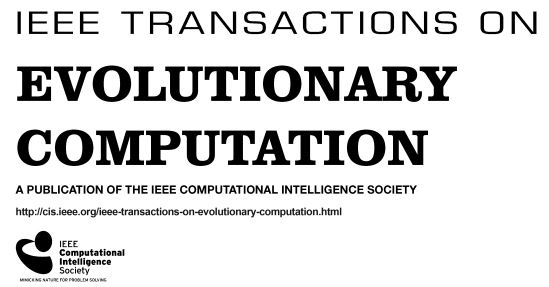Multiform Genetic Programming Framework for Symbolic Regression Problems
IF 11.7
1区 计算机科学
Q1 COMPUTER SCIENCE, ARTIFICIAL INTELLIGENCE
引用次数: 0
Abstract
genetic programming (GP) is a widely recognized and powerful approach for symbolic regression (SR) problems. However, existing GP methods rely on a single form to solve the problem, which limits their search diversity and increases the likelihood of getting stuck in local optima, especially in complex scenarios. In this article, we propose a general multiform GP (MFGP) framework to improve the performance of GP on complicated SR problems. As far as we know, this articel is the first attempt to integrate the multiform optimization paradigm with GP to accelerate the search performance. The key idea of the proposed framework is to construct multiple forms to solve the same problem cooperatively at the same time. During the evolution process, knowledge gained from different forms is shared among the solvers to improve the search diversity and efficiency. A knowledge transfer mechanism is specifically designed to facilitate knowledge transfer among GP solvers with different modeling forms. In addition, an adaptive resource control mechanism is designed to reallocate computing resources according to the problem solving efficiency of different solvers to further improve search efficiency. To demonstrate the effectiveness of the proposed framework, a multiform gene expression programming algorithm is designed and tested on 20 problems, including physical datasets, synthetic datasets, and real-world datasets. The experimental results have demonstrated the effectiveness of the proposed framework.符号回归问题的多形式遗传规划框架
遗传规划(GP)是一种被广泛认可的求解符号回归(SR)问题的有效方法。然而,现有的GP方法依赖于单个表单来解决问题,这限制了它们的搜索多样性,并且增加了陷入局部最优的可能性,特别是在复杂的场景中。在本文中,我们提出了一个通用的多形式GP (MFGP)框架,以提高GP在复杂SR问题上的性能。据我们所知,本文是第一次尝试将多形式优化范式与GP集成以提高搜索性能。该框架的核心思想是构建多个形式同时协同解决同一个问题。在进化过程中,求解器之间共享从不同形式获得的知识,提高了搜索的多样性和效率。针对不同建模形式的GP求解器之间的知识转移问题,设计了知识转移机制。此外,设计了自适应资源控制机制,根据不同求解器的问题求解效率重新分配计算资源,进一步提高搜索效率。为了证明所提出的框架的有效性,设计了一种多形式基因表达编程算法,并在20个问题上进行了测试,包括物理数据集、合成数据集和现实世界数据集。实验结果证明了该框架的有效性。
本文章由计算机程序翻译,如有差异,请以英文原文为准。
求助全文
约1分钟内获得全文
求助全文
来源期刊

IEEE Transactions on Evolutionary Computation
工程技术-计算机:理论方法
CiteScore
21.90
自引率
9.80%
发文量
196
审稿时长
3.6 months
期刊介绍:
The IEEE Transactions on Evolutionary Computation is published by the IEEE Computational Intelligence Society on behalf of 13 societies: Circuits and Systems; Computer; Control Systems; Engineering in Medicine and Biology; Industrial Electronics; Industry Applications; Lasers and Electro-Optics; Oceanic Engineering; Power Engineering; Robotics and Automation; Signal Processing; Social Implications of Technology; and Systems, Man, and Cybernetics. The journal publishes original papers in evolutionary computation and related areas such as nature-inspired algorithms, population-based methods, optimization, and hybrid systems. It welcomes both purely theoretical papers and application papers that provide general insights into these areas of computation.
 求助内容:
求助内容: 应助结果提醒方式:
应助结果提醒方式:


